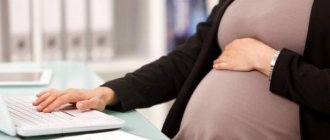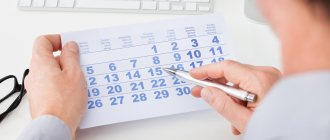The right to leave arises for an employee after six months of continuous work with a particular employer.
Article 122 of the Labor Code of the Russian Federation stipulates the right to grant an employee leave even before the expiration of this period. In addition, this article also establishes a list of categories of employees who should be granted leave upon their application and before the expiration of this period. Labor Code of the Russian Federation
dated December 30, 2001 N 197-FZ
Full text of the article, guides, additional information - in ConsultantPlus
These workers include:
- pregnant employees - they are granted annual leave immediately before or after maternity leave;
- minor workers;
- employees who are adoptive parents of children under 3 months of age;
- husbands of pregnant workers while they are on maternity leave (Article 123 of the Labor Code of the Russian Federation);
- as well as other categories of employees whose right to leave on demand is stipulated by federal regulations.
Leave for part-time workers is granted at the main place and at the part-time place of work simultaneously (Article 286 of the Labor Code of the Russian Federation). Moreover, if at the time of going on leave at the main place of work, the part-time worker has not yet acquired the right to leave at the place of part-time work (worked there for less than 6 months), then leave for the year is granted to him at this place of work in advance, in full, and is fully paid .
Providing leave in advance is also possible in other cases stipulated by the local regulations of a particular employer.
Vacations never expire
The Constitutional Court of the Russian Federation considered the complaint of four citizens who were not paid compensation for unused vacations.
Employers indicated that the maximum period for payment of compensation is 18 months. These one and a half years are counted from the end of the year for which the full-time employee was entitled to leave. The fact is that the ILO Convention on Paid Holidays states that the remainder of the leave should be used no later than the specified period.
The courts supported this position, adding another three months to the appeal period.
Thus, the judges concluded, if 21 months have passed since the end of the specified year, then the employee loses the right to receive monetary compensation.
Based on this position, one of the citizens who applied, for example, was denied compensation for vacation that he did not take for fifteen years: from 1997 to 2012. For the other three applicants, the situations were similar, although not as extensive.
The Constitutional Court of the Russian Federation decided that this approach is erroneous. Although not all courts in our country adhere to it. Others think completely differently. They're right, and here's why.
The 18 months mentioned above is the maximum period for using vacation during the employment relationship. But the data for a year and a half is not limited in any way by the regulated Art. 127 of the Labor Code of the Russian Federation, the scope of the dismissed employee’s right to vacation pay for unused legal rest time.
Upon dismissal, compensation must be paid for all vacations that were not taken by the employee during his employment with the company. In other words, the time that has passed since the year for which the leave was granted does not matter.
Moreover, from October 2021, the period for going to court to recover such compensation is not three months, as before, but a year, which is counted from the moment of dismissal.
The Constitutional Court of the Russian Federation ordered that the cases of citizens be reviewed and prohibited anyone from giving a different interpretation to the described issue and trying to apply it in practice.
Resolution of the Constitutional Court of the Russian Federation dated October 25, 2018 No. 38-P “In the case of verifying the constitutionality of part one of Article 127 and part one of Article 392 of the Labor Code of the Russian Federation in connection with complaints from citizens M.V. Danilova, K.V. Kondakov and others"
Compensation for unused vacation
In accordance with Art. 126 of the Labor Code of the Russian Federation, part of the annual paid leave exceeding 28 calendar days, upon a written application from the employee, can be replaced by monetary compensation. We are talking about disabled people, minors, pelagic workers and other workers who are entitled to leave of more than 28 days.
As for all other employees, even if they have not taken vacation for several years, they cannot replace these vacations with compensation. In accordance with Art. 127 of the Labor Code of the Russian Federation, compensation is possible only upon dismissal of an employee. This topic is discussed in more detail in the article Vacation compensation: when can vacation be replaced with money?
You cannot go on vacation without permission during the May holidays.
The employee wrote an application for leave from May 10 to May 12, 2021 and went on vacation. However, according to the vacation schedule in 2021, he was entitled to annual paid leave from May 15 to 28, as well as from November 13 to 26. Thus, going on vacation on May 10–12 was arbitrary. In this regard, the company issued an order to dismiss him for absenteeism (clause “a”, clause 6, part 1, article 81 of the Labor Code of the Russian Federation).
The court where the employee appealed only supported the organization.
The employee was explained that, in accordance with Art. 123 of the Labor Code of the Russian Federation, the vacation schedule is mandatory for both the employer and the employee. Therefore, you need to go on vacation during the periods indicated in it.
Having written an application for leave on other dates, the employee had no reason to believe that such leave was granted to him. It was necessary to ensure that a leave order had been issued. No order about this was issued.
Thus, the employer had grounds to regard the plaintiff’s absence from work on May 10, 11 and 12, 2021 as a gross violation of labor discipline - absenteeism, and to apply disciplinary action to him for this offense in the form of dismissal on appropriate grounds.
Appeal Ruling of the Moscow City Court dated 02/08/2018 No. 33-1730/2018
Editor's note:
In fact, taking a vacation in May is extremely unprofitable. The fact is that due to holidays there are much fewer working days this month. Therefore, the cost of one working day in May is higher than in those months in which there are no holidays. Consequently, the more working days of May an employee took as vacation, the less salary he will receive compared to the salary he would have received if he had rested these days in another full-time working month, say, in July.
Example.
The employee has a salary of 50 thousand rubles. This means the cost of a vacation day (if he worked the entire pay period): 50 thousand rubles. x 12 months / 12 months x 29.3 = 1,706.48 rubles.
In May 2021 there are 18 working days, that is, the cost of 1 working day = 2,777.77 rubles, and, for example, in August 2021 there are 22 working days, that is, the cost of 1 working day = 2,272.72 rubles. It turns out that if you go on vacation in May and not in August, the difference between the cost of a working day and a vacation day will be noticeable, in other words, the employee will lose more money.
In this way, you can compare the entire year by calculating the cost of working days and comparing them with the cost of a vacation day.
TABLE: “Comparison of monetary losses when going on vacation in different months”
| Months of 2019 | Number of working days | Salary amount | Price working day | Vacation day cost | The difference, that is, the amount of loss per day |
| January | 17 | 50 000 | 2 941,17 | 1 706,48 | 1 234,69 |
| February | 20 | 50 000 | 2 500,00 | 1 706,48 | 793,52 |
| March | 20 | 50 000 | 2 500,00 | 1 706,48 | 793,52 |
| April | 22 | 50 000 | 2 272,72 | 1 706,48 | 566,24 |
| May | 18 | 50 000 | 2 777,77 | 1 706,48 | 1 071,29 |
| June | 19 | 50 000 | 2 631,57 | 1 706,48 | 925,09 |
| July | 23 | 50 000 | 2 173,91 | 1 706,48 | 467,43 |
| August | 22 | 50 000 | 2 272,72 | 1 706,48 | 566,24 |
| September | 21 | 50 000 | 2 380,95 | 1 706,48 | 674,47 |
| October | 23 | 50 000 | 2 173,91 | 1 706,48 | 467,43 |
| November | 20 | 50 000 | 2 500,00 | 1 706,48 | 793,52 |
| December | 22 | 50 000 | 2 272,72 | 1 706,48 | 566,24 |
Conclusion: in 2021, it is most expensive to go on vacation in January and May, and the most profitable time off will be in July and October.
Duration of vacation: understanding the terminology
According to Art.
120 of the Labor Code of the Russian Federation, annual basic paid leave is provided in calendar days, therefore, it does not matter what day according to the calendar and schedule the vacation time falls on. Its minimum duration is 28 calendar days (Article 115 of the Labor Code of the Russian Federation). But there are employees who are entitled to extended leave: disabled people, civil servants, teaching staff, minors, etc. The duration of leave does not include only non-working holidays, which are defined in Art. 112 Labor Code of the Russian Federation. So, for example, if an employee takes vacation from June 1 to June 28, then he needs to leave the vacation not on June 29, but on June 30, since the vacation days include a non-working holiday - June 12. In this case, the order to grant leave to the employee is completed simply: in the line “Annual paid leave” 28 calendar days are indicated, and in the period “from ... to” the dates from June 1 to June 29 are written.
Rescheduled weekends, which are included in the vacation duration, should not be confused with non-working holidays. Please note how the transfer of holidays in 2020 is established.
The Ministry of Labor of the Russian Federation prohibited employers from providing vacations on weekends
Officials believe that providing vacations starting from Saturday or Sunday does not contradict the norms of the Labor Code of the Russian Federation. But if an employee’s vacation falls exclusively on weekends, then the company will face an administrative fine of 50 thousand rubles.
Letter of the Ministry of Labor of the Russian Federation dated December 7, 2018 No. 14-2/OOG-9754
Editor's note:
One can argue with the position of the Ministry of Labor of the Russian Federation. The fact is that the code allows you to split your vacation into parts. The main thing is that one of them is at least two weeks old. Workers have the right to take the remaining days as they wish.
According to the Labor Code of the Russian Federation, vacation is given in calendar days. In this regard, a citizen can use it on weekends.
Let us note that workers do not take vacations in this way because they have a good life. Thus, they receive vacation payments for the weekend, depriving themselves of rest days.
Types of vacations
The Labor Code interprets vacation as a long period of rest with the employee retaining not only his place, but also his earnings. Such rest is provided to all employees annually (Article 114 of the Labor Code of the Russian Federation). This rule applies to any employers, be they individuals, individual entrepreneurs or organizations of all possible forms.
Providing annual paid time off is a non-negotiable responsibility. Violation of it threatens the employer with administrative, and in especially severe cases, criminal liability.
There are two types of paid leave:
- basic, which applies to all employees;
- additional, provided for special working conditions.
In addition to annual leave, when the employee retains his salary, there are also unpaid leaves. Most employees are granted such leave at their own expense with the consent of the employer. But there are categories of employees who are entitled to such leave by virtue of the law:
- WWII participants;
- pensioners who continue to work;
- family members of military and law enforcement officers who died in service;
- working disabled people.
Unpaid days must be provided to any employee in important cases: the birth of a child, a wedding, the death of a loved one. The list of situations when an employee can exercise his right to additional rest is open. In the organization itself, the collective agreement also contains other conditions for providing leave without pay.
Special leave can be taken by an employee to take exams at an educational institution: entrance, intermediate or final (paid and at his own expense). The employer’s obligation to allow an employee to go on study leave and pay for it occurs only if two conditions are met:
- the educational institution (university or secondary educational institution) has a state license and accreditation;
- This is the first time that an employee receives education at this level.
Ministry of Labor: how to provide leave to employees with many children
Thanks to the amendments introduced by Federal Law No. 360-FZ of October 11, 2018 to the Labor Code of the Russian Federation, parents with many children have the opportunity to go on vacation at any time convenient for them. Condition: having three or more children under 12 years of age.
However, the code does not establish a special procedure for granting leave for this category. Therefore, in addition to preferences in the order of vacations, parents with many children go on vacation like everyone else. That is, the right to vacation appears to employees who have been working in the company for at least 6 months. However, by agreement with the employer, they can go on vacation earlier than the established period.
Letter of the Ministry of Labor of the Russian Federation dated November 20, 2018 No. 14-2/OOG-9211
Editor's note:
The age of children is calculated based on the year of leave granted (Letter of the Ministry of Labor of the Russian Federation dated November 20, 2018 No. 14-2/OOG-9166).
What do you need to know about holiday entitlement?
Employers should adhere to the basic rule - paid leave must be provided to the employee annually, because this is required by the Labor Code.
At the same time, in Art. 124 of the Labor Code of the Russian Federation contains the following clause: “In exceptional cases, when the provision of leave to an employee in the current working year may adversely affect the normal course of work of an organization or individual entrepreneur, it is allowed, with the consent of the employee, to transfer the leave to the next working year. In this case, the leave must be used no later than 12 months after the end of the working year for which it is granted.”
The right to use vacation for the first year of work arises for the employee after six months of his continuous work with the employer, although by agreement of the parties it can be granted earlier. Some employers find this definition misleading. They reason like this: the employee can indeed write a statement, but the employer has the right to decide whether he will let him go on vacation or not. From a legal point of view, after six months of work, the employee has every right to write an application for leave for all 28 days, and the employer is obliged to provide him with this leave.
Leave for the second and subsequent years of work can be granted at any time of the working year in accordance with the order of provision of annual paid leave established by the employer.
The Ministry of Labor of the Russian Federation explained in what cases annual leave is not required
The Labor Code of the Russian Federation allows a woman to go on maternity leave for up to three years. This right can also be exercised by the child’s father, grandmother, grandfather, and other relatives who care for the child. During this time, the employee or her relatives caring for the baby have the right to go to work or work at home on a part-time basis.
Workers who work according to this schedule are subject to all labor laws. That is, they can, like other employees, go on annual paid leave. The number of vacation days does not depend on the time worked per year. This means that if a citizen worked for a year on a part-time schedule, then he has the right to rest for all the required 28 calendar days. Therefore, if an employee combined child care with work, then this period will be included in the length of service giving the right to basic paid leave.
However, the Ministry of Labor of the Russian Federation warns that the provision of two labor holidays at the same time is not provided. Thus, in order to take advantage of annual leave, children's leave must be interrupted. By the way, it can be resumed later.
Letter of the Ministry of Labor of the Russian Federation dated October 25, 2018 No. 14-2/OOG-8519
Editor's note:
Let us note that the court allows interruption of “children’s” leave for the sake of annual leave (Resolution of the Arbitration Court of the Far Eastern District dated November 27, 2018 No. F03-4742/2018). The Federal Social Insurance Fund of the Russian Federation refused to offset the child care benefits paid to the employee. The inspectors were dissatisfied with the upward recalculation of benefits, the reason for which was the specialist’s annual paid leave, for which the main “children’s” leave was interrupted for 6 days.
However, from the first verdict in the case, the courts sided with the company, and the legality of such a suspension of parental leave was confirmed in Resolution of the Plenum of the Armed Forces of the Russian Federation dated January 28, 2014 No. 1.
The fund's arguments that this position is correct only for part-time workers were rejected by the district cassation, emphasizing the universal nature of the clarifications of the RF Armed Forces.
Vacation experience: what is included in it?
All rules for determining length of service giving the right to annual paid leave are laid down in Art. 121 Labor Code of the Russian Federation. And here it is important to pay attention to the fact that it includes not only the time of actual work, but also periods when the employee did not actually work, but retained his place of work (position).
Also in Art. 121 of the Labor Code of the Russian Federation specifies the time of unpaid leave provided at the request of an employee, not exceeding 14 calendar days during the working year. This rule means that 14 days are always included in the length of service giving the right to annual paid leave, and anything that exceeds these 14 days delays the end of the working year. This is also stated in the Letter of Rostrud dated June 14, 2012 No. 854-6-1.
In addition to the above-mentioned cases, the length of service that gives the right to annual basic paid leave includes: time of forced absence in the event of illegal dismissal or suspension from work and subsequent reinstatement to the previous job; the period of suspension from work of an employee who did not undergo a mandatory medical examination through no fault of his own, and other periods. This topic is discussed in more detail in the article Vacation experience: how to determine in various situations.
A child’s illness is not a reason to extend a parent’s vacation
If an employee falls ill during his vacation, then it should be extended or the rest days transferred to another time (by agreement with the employee). However, if the illness overtakes the child, then the parent’s leave is not extended, because such a right is not enshrined in the Labor Code of the Russian Federation.
However, due to its financial capabilities, the employer has the right to extend vacation in such a situation, if this is enshrined in a local act.
Editor's note:
Similar conclusions are contained in the Letter of Rostrud dated 06/01/2012 No. PG/4629-6-1.
Vacation schedule
Leave under the Labor Code for a newly hired employee is possible after six months. However, the employer can do this earlier if there is such a need or opportunity. Then all employees are entitled to a long rest annually.
The duration of annual leave for most employees is not strictly fixed. They can relax at any time of the year. The exception is those organizations whose work is highly seasonal. For example, teachers use their right to rest almost exclusively in the summer, during long holidays. At other times, their absence from work causes difficulties in organizing normal training.
The rest time of each employee is recorded in a special personnel document - a vacation schedule. It is drawn up in advance and should be brought to the attention of the team two weeks before the new year. Considering the need for coordination with the trade union, planning department and accounting department, it is advisable to begin preparations in November.
The schedule is drawn up taking into account the wishes of the employees themselves and the opinion of the employer, who is interested in the smooth operation of the organization. Parents of schoolchildren and younger children primarily receive vacations during the summer months. Others may be offered other terms. For part-time workers, the dates when vacation is due must coincide with those for the main job.
Despite the fact that the vacation schedule is mandatory for both parties to the employment relationship, changes are made to it if necessary. Rest periods can be changed by mutual agreement. This decision is reflected in the schedule itself, as are the new vacation dates.
When do you need to pay vacation pay to avoid being fined?
The Labor Code of the Russian Federation requires payment for vacation three days before it starts. The employer does not have the right to adjust this period downward. Moreover, this is a minimum period of time. Therefore, money can be issued even earlier.
The majority of workers go on vacation on Monday. Employers are wondering: when in this case should they pay their employees?
According to the Ministry of Labor of the Russian Federation, the deadline for issuing vacation pay here is Thursday of the previous week.
Letter of the Ministry of Labor of the Russian Federation dated September 05, 2018 No. 14-1/OOG-7157
Editor's note:
If the employer delays the payment of vacation pay, he faces administrative liability under Art. 5.27 Code of Administrative Offenses of the Russian Federation. Please note: the absence of the employer’s fault in violating the deadline for paying vacation pay does not relieve him of this responsibility, since there are no exceptions to the rules provided for in Part 9 of Art. 136 of the Labor Code of the Russian Federation (Letter of the Ministry of Labor of the Russian Federation dated August 26, 2015 No. 14-2/B-644). Let’s say an employee, due to family reasons (for example, a close relative is sick), asks to be given paid leave for several days starting tomorrow. The employer does not object; the accountant calculates and pays him vacation pay on the day on which the application is dated. In this case, the company violates the rule on payment of vacation pay three days before the start of the vacation, established by Art. 136 Labor Code of the Russian Federation. After all, this norm is imperative and has no exceptions. Therefore, in this case, a fine may be imposed on the employer under paragraph 1 of Art. 5.27 Code of Administrative Offenses of the Russian Federation - from 30 to 50 thousand rubles.
Let us note that a number of judges support this position of the department (Resolution of the Perm Regional Court dated March 15, 2018 No. 44a-318/2018, rulings of the Chelyabinsk Regional Court dated September 17, 2015 No. 11-11043/2015, Rostov Regional Court dated September 16, 2013 No. 33- 11864).
Results
Annual leave is mandatory for each employee after a certain period of work with the employer giving the leave. In some cases this period may be shortened. When employees go on vacation during each calendar year, it is regulated by the vacation schedule approved for that year.
The duration of full annual leave is 28 calendar days, but can be increased by additional days provided. Persons of certain categories are given additional leave without fail. Vacations may be split into parts.
Vacation pay is paid no later than 3 days before the start of the vacation. Their calculation is done for the actually used number of vacation days by multiplying them by the average daily earnings. The latter value is calculated from the income received by the employee at the place of receipt of leave for the 12 months preceding the month of going on leave, and taking into account the legally established average number of months per year. Vacation pay when the billing period is not fully worked out occurs according to a special formula.
Sources: Labor Code of the Russian Federation
You can find more complete information on the topic in ConsultantPlus. Free trial access to the system for 2 days.
What bonuses are included in the calculation of average earnings when calculating vacation pay?
Question. What bonuses are included in the calculation of average earnings for calculating vacation pay? Over the past year, our organization paid: a bonus based on work results for 6 months (payment in July 2021) and a bonus based on work results for the year (payment in January 2019). Also, some employees were paid a bonus based on the results of their work for the month.
Answer. When calculating average earnings, various types of bonuses can be taken into account. To do this, they must be provided for by the organization’s remuneration system, fall within the appropriate billing period (with the exception of the annual bonus, which is taken into account regardless of the accrual period), and must also be taken into account once on each basis (or for one indicator).
As is known, to pay for the period while on vacation, amounts are taken from the calculation of average earnings, the general procedure for calculating which is contained in Art. 139 Labor Code of the Russian Federation. In accordance with this article, to calculate the average salary, all types of payments provided for by the remuneration system and applied by the relevant employer are taken into account, regardless of the sources of these payments.
Similar provisions are contained in Decree of the Government of the Russian Federation dated December 24, 2007 No. 922. In paragraphs. “n” clause 2 indicates the need to include in the calculation bonuses and remunerations provided for by the remuneration system.
These standards establish the main criterion for answering the question of whether certain types of bonus payments should be included in the calculation of average earnings. That is, in order to account for bonuses, they must initially be provided for in labor, collective agreements or the organization’s local regulatory act on bonuses. In other words, payments must be provided for by the current wage system.
The second important criterion for taking into account the bonus in calculating average earnings: it must be actually accrued in the billing period (clause 15 of the Decree of the Government of the Russian Federation of December 24, 2007 No. 922). An exception is made for the annual bonus; the accrual period does not matter for it.
In accordance with clause 15 of the Regulation on the specifics of the procedure for calculating average wages No. 922, when determining average earnings, bonuses and remunerations are taken into account in the following order:
- monthly bonuses and rewards - actually accrued in the billing period, but not more than one payment for each indicator of each month of the billing period;
- bonuses and remunerations for a period of work exceeding one month - actually accrued in the billing period for each indicator, if the duration of the period for which they are accrued does not exceed the duration of the billing period, and in the amount of the monthly part for each month of the billing period, if the duration of the period for which they are accrued exceeds the duration of the billing period;
- remuneration based on the results of work for the year, a one-time remuneration for length of service (work experience), other remunerations based on the results of work for the year, accrued for the calendar year preceding the event, regardless of the time the remuneration was accrued.
The third essential point follows from the provisions of clause 15 - this is the one-time accounting of bonuses for each of the indicators for which they were accrued.
It should be noted that if the bonus period does not fall completely into the calculation period, then, according to the clarifications of the Ministry of Health and Social Development of the Russian Federation in letter No. 2337-17 dated June 26, 2008, the bonus can be taken into account in its entirety when calculating vacation pay only if it is accrued for the months that fall within the calculation period. period. Otherwise, it must be distributed in proportion to the time worked in the billing period.
To calculate average earnings, social payments and other payments not related to wages (material assistance, payment for the cost of food, travel, training, utilities, recreation, etc.) are not taken into account.
How to calculate length of service for main leave if there was a month of absence for family reasons
An employee of the company took vacation at his own expense twice for a total duration of 30 days. How to take this month into account when calculating length of service for the purpose of annual basic leave?
By virtue of Part 1 of Art. 121 of the Labor Code of the Russian Federation , the maximum duration of leave at one’s own expense, which is taken into account in the length of service required for the main leave, cannot exceed a 14-day period.
Days beyond this duration (in the case under consideration - the remaining 16-day period) are not included in the length of service. The end of the working year must be shifted to the period of absence of the worker, deleted from the length of service.
In this case, in the vacation order (form No. T-6, form according to OKUD 0301005), in the column responsible for the working period, the date is entered in the following order. For example, instead of “from June 1, 2021 to May 31, 2020,” to “from June 16, 2021 to June 15, 2021.”
It should be taken into account that the period of downtime is also included in the length of service.
More details in the letter of the State Labor Inspectorate in Moscow dated 06/04/2020 No. 77/10-20669-OB/18-1299.







